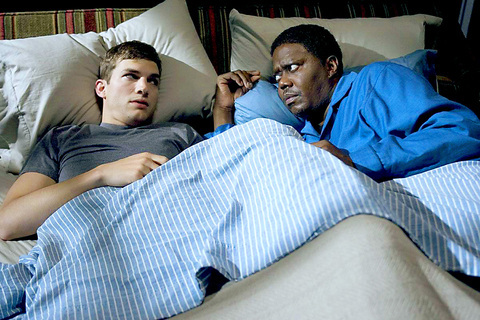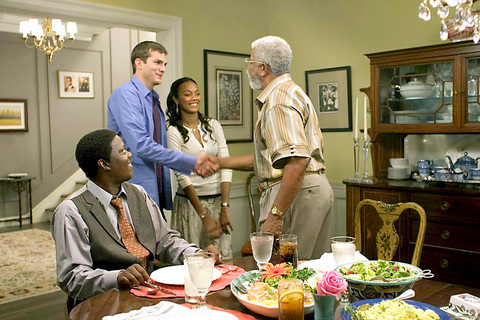Guess Who's Coming to Dinner, that corny, earnest comedy of racial tolerance from 1967, has been remade as a domestic farce, with the roles reversed. This time, in Guess Who (dinner having been replaced by an entire weekend), the crusty, suspicious father who must overcome his prejudices is black (Bernie Mac), while his daughter's fiance (originally a doctor played by Sidney Poitier, now a stockbroker played by Ashton Kutcher) is white. Is the new version evidence of social progress or of cultural decline?
A bit of both, perhaps. On the side of progress, it seems that the racial hang-ups and pieties that made Guess Who's Coming to Dinner both necessary and wincingly stiff have relaxed, and that interracial love is not the big deal it used to be. As for cultural decline, well, the name Ashton Kutcher is pretty much a synonym for it.
But it is hard to get very upset about this remake. For one thing, the first movie, important though it may have been, was not all that great. And for another, Guess Who, directed by Kevin Rodney Sullivan (Barbershop 2) from a screenplay credited to David Ronn, Jay Scherick and Peter Tolan, is so mild and thin that it doesn't inspire much of a reaction at all.

PHOTO COURTESY OF FOX MOVIES
With one exception -- a dinner table scene that is by far the most memorable in the movie -- the racial humor is studiously unprovocative. Other avenues of comedy (the differences between men and women, the sexuality of party planners, the humorous effects of alcohol) are dutifully traveled, not imaginatively explored.
What is left -- the potentially interesting, mostly squandered premise that probably caused the picture to be greenlighted in the first place -- is a cross-racial buddy comedy based on the confrontation between Mac's bearish truculence and Kutcher's loose, spazzy amiability. The two performers do their best, but the writing is so tired and the direction so slack that their collisions never acquire much momentum or spark. They are quick and nimble comic actors in the movie, which for the most part strands them in a lumbering sequence of slackly paced, predictable scenes.
Mac's character, Percy Jones (most people in the film, including his immediate family, use both names), is a New Jersey loan officer about to renew his vows with Marilyn, his wife of 25 years (Judith Scott). Percy's older daughter, Theresa (Zoe Saldana), is coming from New York with her boyfriend, Simon (Kutcher). Theresa has neglected to inform her family that Simon is white, and he has not told her that he just quit his job at a prestigious investment bank. Those two omissions provide fuel for the misunderstandings to come, which culminate in the usual relationship-threatening recriminations followed, in the nick of time, by reconciliation.

As he did in Just Married, Kutcher plays a friendly young man attached to an intensely attractive woman and prevented by circumstances from sleeping with her. In this case, it is Percy Jones's stern, patriarchal attitude that keeps the lovers apart, as he winds up sharing a bed in the basement with his would-be son-in-law to protect his daughter's honor.
Simon, who grew up without a father (one of the film's subtler reversals of stereotype), may be exasperated by Percy's bullying, but he also respects the older man's devotion. The bullying, though not as sadistic as Robert De Niro's treatment of Ben Stiller in Meet the Parents, is nonetheless pretty constant. It reaches a peak in that dinner table moment in which Percy goads Simon into telling racist jokes, goading him to cross the line and then taking offense when he does.
The rest of Guess Who is not nearly so reckless, but its blandness has less to do with caution than with comfort. In its easy, affluent setting, what prejudices remain can be shrugged and laughed off. Guess Who suggests, convincingly enough, that race relations (to use a quaint-sounding term) have gotten a lot better since 1967, which may be one of the reasons this movie is so much worse than its predecessor.

PHOTOS COURTESY OF FOX MOVIES

April 28 to May 4 During the Japanese colonial era, a city’s “first” high school typically served Japanese students, while Taiwanese attended the “second” high school. Only in Taichung was this reversed. That’s because when Taichung First High School opened its doors on May 1, 1915 to serve Taiwanese students who were previously barred from secondary education, it was the only high school in town. Former principal Hideo Azukisawa threatened to quit when the government in 1922 attempted to transfer the “first” designation to a new local high school for Japanese students, leading to this unusual situation. Prior to the Taichung First

The Ministry of Education last month proposed a nationwide ban on mobile devices in schools, aiming to curb concerns over student phone addiction. Under the revised regulation, which will take effect in August, teachers and schools will be required to collect mobile devices — including phones, laptops and wearables devices — for safekeeping during school hours, unless they are being used for educational purposes. For Chang Fong-ching (張鳳琴), the ban will have a positive impact. “It’s a good move,” says the professor in the department of

On April 17, Chinese Nationalist Party (KMT) Chairman Eric Chu (朱立倫) launched a bold campaign to revive and revitalize the KMT base by calling for an impromptu rally at the Taipei prosecutor’s offices to protest recent arrests of KMT recall campaigners over allegations of forgery and fraud involving signatures of dead voters. The protest had no time to apply for permits and was illegal, but that played into the sense of opposition grievance at alleged weaponization of the judiciary by the Democratic Progressive Party (DPP) to “annihilate” the opposition parties. Blamed for faltering recall campaigns and faced with a KMT chair

Article 2 of the Additional Articles of the Constitution of the Republic of China (中華民國憲法增修條文) stipulates that upon a vote of no confidence in the premier, the president can dissolve the legislature within 10 days. If the legislature is dissolved, a new legislative election must be held within 60 days, and the legislators’ terms will then be reckoned from that election. Two weeks ago Taipei Mayor Chiang Wan-an (蔣萬安) of the Chinese Nationalist Party (KMT) proposed that the legislature hold a vote of no confidence in the premier and dare the president to dissolve the legislature. The legislature is currently controlled